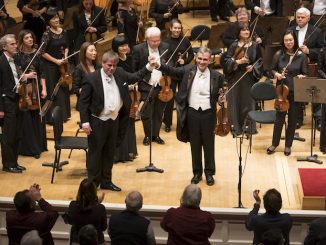
On January 30, 2020, in a program to be repeated January 31st, February 1st and February 4th, Sir Andrew Davis, Music Director, Lyric Opera, Chicago, conducted Paul Lewis, pianist and The Chicago Symphony Orchestra in a concert comprised of two shorter works by British composer Michael Tippett, each performed for the first time at Symphony Center, Chicago, and each followed by a Beethoven Piano Concerto, the thoroughly well-explored métier of the British Guest Pianist.
The CSO, just returned from a European tour, performed each of the Tippett pieces in ensemble, as designated in the title of the work.
- Michael Tippett Little Music for String Orchestra, 1946
- Michael Tippett Praeludium for Brass, Bells and Percussion, 1962
The prolific British composer Michael Tippett’s compositional career extended over 8 decades and many genres, from full-length operas to orchestral works on various scales, like the baroque-inspired Little Music, to brass band fanfares, such as the unusual example of the same, Praeludium, performed this evening.
It’s been written that Beethoven’s work was a profound “formative influence in form and sheer strength” for a deal of Tippett’s music. For a seasoned opera maestro, like Davis, who said that he’d been a fan of Tippet’s work since age 15, the challenge inherent in this music- to balance and direct the unusual textures and rapidly shifting colors- must have been a familiar one. As for the great CSO, this music, said to be “trickier to play than it sounds,” was brought forth with a clarity and a vivid definition in the rhythmic tempi.

- Ludwig van Beethoven Piano Concerto No. 1 in C major, Op. 15, 1795
- Ludwig Van Beethoven Piano Concerto No. 4 in G major, Op. 58, 1805-06
In execution, Lewis is superior, at one and the same time achieving a seemingly infinite plethora of nuance and shadings in his fingering, yet also fully passionate and “musical.” His vast experience performing and recording Beethoven (check out his Beethoven: Piano Concertos No.s 1-5 released in 2010 by Harmonia Mundi) coupled with his dynamic range has imbued his performances with a fully realized exposition of Beethoven’s “relentlessly contrasting textures.” Davis elicited precise and ultra-detailed playing from the CSO.
The first movement Allegro of the Concerto No. 1 in C Major is a harbinger of the 2 that follow. The tempo is not particularly fast, but the piece is lively and exuberant. Davis drew from the CSO a blend of calm sensibilities mingled with moments of urgency. The theme was laid out clearly and purposefully; when Lewis entered, he did so with similar clarity and immediacy. This pianist seems able to shift imperceptibly from delicacy to strength to mystery, to lead without grandstanding, in this tender yet playful work formed upon a rich instrumental ensemble including clarinets, trumpets and timpani.
By contrast, the Concerto No. 4 in G Major, long considered one of the composer’s greatest, is looser, freer and more lyrical. History tells us that this piece, begun in 1805, was crafted in one of Beethoven’s most densely creative periods. From the very first notes of the opening Allegro, this work- and Lewis’ fingering- grab the audience and don’t let go. Unlike No. 1 (and unlike the tradition), the piano soloist opens the work, sans introduction by the orchestra. However, the orchestra is by no means relegated to merely accompanying the soloist. Davis finessed the relationship between the CSO and Lewis with a carefully balanced expressiveness; they met and exchanged a complex dialogue, a truly romantic commencement.

For information and tickets to all the great programming of The Chicago Symphony Orchestra, go to www.cso.org
All photos by Todd Rosenberg




Be the first to comment